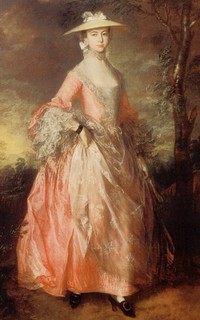
Philanthropy and charity
From: Dr Johnson's London:Generally a group would form a Foundation.
The Foundling Hospital. Caring for abandoned babies -- foundlings.
Founded by Captain Thomas Coram, but he gathered fashionable patrons.
Opened in 1741, capacity 30 babies. Started in Hatton Garden, but soon moved to purpose built premises near Gray's Inn.
Babies were left with tokens and mothers got a receipt in case they wanted to claim them later.
Breastfeeding preferred, so if possible the babies were sent to the country to be fed for 2 to 4 years.
They returned at about 3 and were innoculated against smallpox. Taught to read, given exercise and toys.
From 6 the girls were trained in household tasks, boys in gardening then at about 12 sent to sea or agricultural labour.
1756, the government agreed to sponsor it if it took all babies offered. In first 4 weeks after this, 425 babies arrived from all over the country.
From 1765 to 1760 15,000 admitted, c 11,000 died. Reverted to a private charity taking about 30 babies a year.
The Marine Society found sailors for the 7 Years War by equipping those willing, including those who'd come before the courts.
Supplied over 10,000 and helped those demobbed to trades.
1769, they switched to placing homeless boys into maritime trades.
Female Orphan Asylum
Founded by John Fielding, 1758
Preference given to orphans of servicemen, and they had to be healthy.
Trained for domestic service and apprenticed out at 15 for seven years to good families.
The Magdalen Charity
For prostitutes who wanted to quit. Provided a place, but not free to come and go lest they fall into temptation. Expected to work, but it's not clear at what.
The Scots Corporation provided for poor Scottish people and orphans.
La Soupe provided food for Huguenots, and there was a French hospital.
Almshouses for the old, set up by individuals.
Individual giving.
Always a need for trusses.
Pay off someone in debtor's prison.